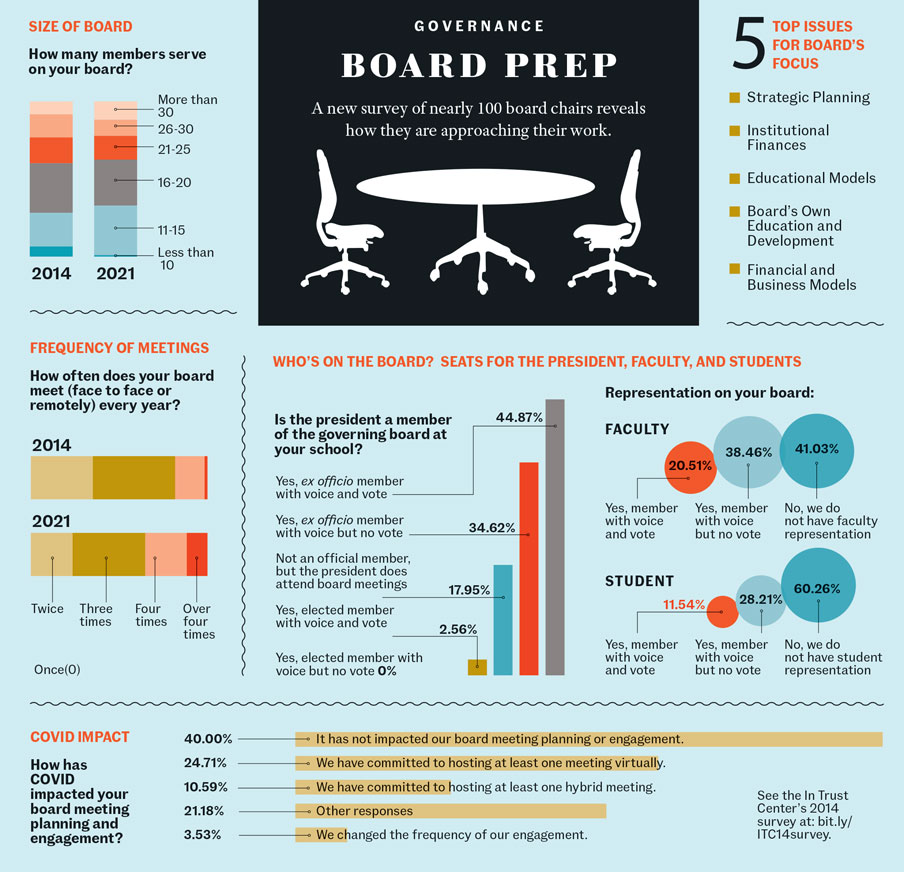
To see the In Trust Center’s 2014 survey, click here.
Infographics by MsJonesNYC
In a recent survey, a plurality of theological school board chairs said the pandemic had little effect on the core work they do, but the way they do that work certainly changed. The In Trust Center survey showed that boards are using more technology to do the work and are meeting more often.
Nearly 100 board chairs responded to the fall 2021 survey, and it follows a similar survey the In Trust Center conducted in the fall of 2014. In the latest survey that asked about board practices, board chairs reported that they felt their work continued on well through the pandemic. However, the effects of the pandemic are clear, with boards continuing the use of virtual meetings as 83% of schools will have either fully online or hybrid meetings this academic year.
“The results suggest that the board chairs surveyed have adapted well to the times and are using the technology to benefit their work,” said Annie Glanden, vice president of programs at the In Trust Center. “The use of virtual and hybridboard meetings can be a real positive for schools, as boards can gather easily without the need to arrange travel or meeting space. They can also meet outside of the normal board meeting space, particularly for committee work.”
The new survey shows how boards and school leadership have adapted to technology. In the 2014 survey, board leaders were asked whether they used technology, such as video or conference calling, to meet between face-to-face meetings.
Nearly half of the schools that responded – 45% – said they did not use technology to meet. And among the schools that used technology to meet, only 8% used video conferencing.
The new survey shows that an overwhelming majority of boards use online meeting technology, and nearly a third of schools expect to have at least one fully virtual meeting with 15% planning to have all of their meetings online.
The fact that board leaders continue to look at their own development and education as a top priority is an excellent sign of the health of theological schools.
Technology and engagement
One board chair noted higher attendance at meetings when they’re held on Zoom and planned a mixture of Zoom and in-person meetings. Another board chair noted that the pandemic forced virtual committee meetings, and that meant that instead of having committees meet during a scheduled board meeting day, committees met between times virtually. As well, virtual meetings have forced many boards to prioritize agenda items, given reduced meeting time. Board chairs see value in the online meeting space.
“Even when in-person board meetings can safety resume, we plan to continue and advance virtual committee meetings,” one board chair wrote. Glanden said the schools that have committees meet virtually between regular board sessions and those that have increased meeting frequency could see board engagement improve as they meet more regularly.
“It also can be a real benefit because it provides board members additional opportunities to deepen their relationships with each other and their connection with the school’s leadership and mission” Glanden said.
Even as many schools have or are planning to resume in-person meetings, there was a high engagement with online and hybrid meetings with plans for the next year.
“We’ve determined to meet every other month going forward – one in-person retreat and remote in between,” wrote one board chair.
The survey does show an increase of board meetings – likely due to the ease of meeting virtually, as well as the need for additional meetings to focus on strategic issues. In 2014, 18% of boards surveyed met four or more times a year. In the most recent survey, that doubled with nearly 36% of surveyed boards planning to meet four or more times in the next year.
Board representation
The size of boards has remained roughly the same in the past seven years. Boards with 20 or fewer members made up 62% of the respondents, up from 60 percernt in the 2014 survey. In both surveys, nearly a quarter – 23% – of schools reported board sizes of 26 members or more.
Half of the schools surveyed had some form of formal faculty representation on their board – 12% had faculty with both voice and vote, 38% had faculty voice.
Regarding student participation, 40% of schools had some formal way of including students.
“We welcome all faculty and staff to attend board meetings and solicit their ‘voices’ in all matters,” said one chair.
Bylaws and terms
The new survey also showed strong board engagement with the school’s bylaws. Nearly three-quarters of board chairs said their boards regularly reviewed their bylaws, with many board chairs laying out specific review periods set in the bylaws or board policies. They said they had cycles, ranging from annually to every three to five years. “Bylaws are a part of every board gathering but not every agenda,” one board chair wrote. “Bylaws are reviewed constantly for updates and changes.”
The board chairs also reported that most schools have term limits for their board members, with two-thirds of board chairs reporting that they have strictly enforced term limits, and 7% of schools reporting their term limits were not strictly enforced. And 14% of schools reported that they did not have term limits for their members. Schools with term limits reported three- to four-year terms with most schools allowing two to three renewals.
Board development
When asked for top issues, board chairs included nearly two dozen topics. The reoccurring themes were not surprising, including strategic planning, finances, education models, and business and financial models. But the board’s own education and development were also among the top priorities, and that’s a good thing, Glanden said.
“The fact that board leaders continue to look at their own development and education as a top priority is an excellent sign of the health of theological schools,” Glanden said. “The best boards are those that continue to develop their capacity and continue to learn. Over the past 30 plus years, we have been providing resources and development opportunities for boards as we continue to champion good governance.”
The In Trust Center has multiple ways to help theological schools and their boards. For more information and resources on how to build board leadership and capacity, send a message to resources@intrust.org.

Reflection How does your board approach its role in fundraising?
Illustration by Andre Da Loba
Remark(able)
“Fund-raising is, first and foremost, a form of ministry. It is a way of announcing our vision and inviting other people into our mission. Vision and mission are so central to the life of God’s people that without vision we perish and without mission we lose our way.”
— From A Spirituality of Fundraising by Henri J.M. Nouwen.